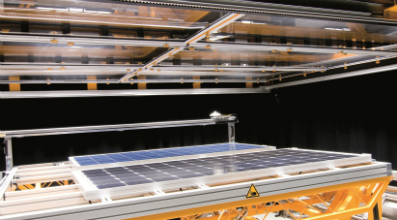Solar Simulator to Test PVT Performance
Published: Tuesday, September 17, 2013
In 2011 PSE AG of Freiburg, Germany, provided the Cologne Solar Energy Assessment Centre of TÜV Rheinland with a new steady state solar simulator. This test bench is to be used for measuring photovoltaic modules, thermal solar collectors and combinations of both technologies, known as PVT, for the first time in a sun simulator. The impressive new test bench includes a Kipp & Zonen CMP 11 pyranometer as the irradiance reference.
Under laboratory conditions a sun simulator provides photovoltaic modules or solar collectors with light from a sun-like source. This means that measurements can be performed and reproduced under precisely defined conditions which are independent of climate. The measured results help TÜV to find answers to the question of whether solar modules and sun collectors actually deliver on their promised performance and the service guarantees made by manufacturers.
The CMP 11 measures the incoming radiation at the same angle as the tested solar energy system. The data from the pyranometer is recorded and compared to the energy generated by the tested object. The CMP 11’s flat spectral response and high quality ensure an accurate reading of all the incoming radiation.
In addition to the combined suitability for both solar thermal and photovoltaic modules, another special feature of this innovative test bench is the automatic shading facility. This facility means that TÜV Rheinland’s experts can expose the photovoltaic modules to radiation for a specific period of time and determine the time constants of thermal collectors.
The 12 metal halide global (MHG) lamps provided by Atlas MTT GmbH have a controllable radiation power of up to 1,200 W/m². An “artificial sky” simulates natural long-wave radiation exchange so that the heat of the lamps does not affect the measured results.
These high-performance radiation sources are integrated into a movable lamp holder. In conjunction with the test table that can be tilted, this allows the TÜV Rheinland inspectors to implement various test configurations, using angles between 0° and 45 °. As the photovoltaic module and thermal collector test surfaces may require different alignments for the measurements, two independent test tables are needed.
TÜV Rheinland is a leading global independent test provider with a history stretching back 140 years. The Group maintains a presence at 500 locations in 65 countries with 16,000 employees. Their independent experts stand for quality and safety for people, the environment, and technology in nearly all aspects of life.
PSE AG provides solar test equipment and consulting services to international customers. PSE test benches are used by institutes and manufacturers for performance and quality testing as well as for certification in accordance with international standards. The company was founded in 1999 as a spin-o_ from the Fraunhofer Institute for Solar Energy Systems (ISE).
Find out more about the PSE at www.pse.de and TÜV Rheinland at www.tuv.com
